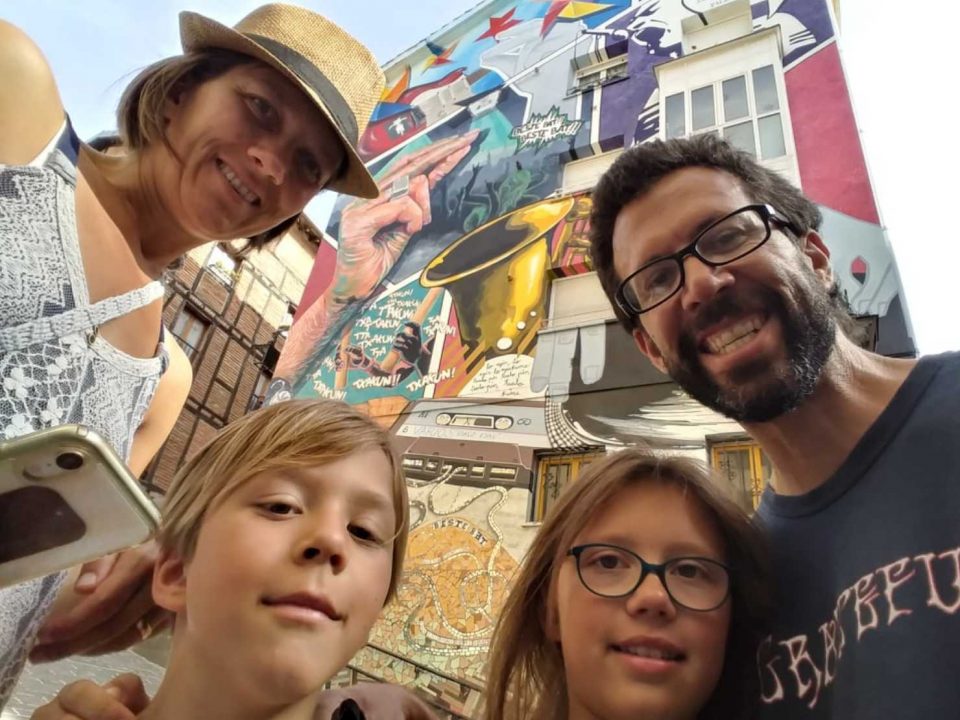
New Education: Out of the classroom and into the wild
February 6, 2019
14 SEO Tips to increase traffic and rankings
February 12, 2019If you’ve read our articles about WWOOFing with Children and How we left everything behind to teach our kids to be world citizens, then chances are you may have asked yourself: How do they do it? Maybe you’d love to quit your job and travel the world with your kids, but you just can’t imagine how you’d earn money on the move. Yes, that’s a great question, and like a lot of things, it’s maybe not as easy as it looks.
The traveling classroom
Let me begin by introducing you to this subculture that we found ourselves in. Now I’ve never really been the kind of person to go out searching for a group to belong to or a label I could apply to myself. But when we sold our house, our business, and 96 percent of our earthly possessions to travel the world with our kids, we soon discovered that we weren’t the first family to have ever had this idea.
A lot of people talk about it, and far fewer actually do it, but yes, people do it. And when we did it, it felt a lot like we were going where no man had gone before. But in fact, there’s a whole coterie of families doing something very similar. And thanks largely to the miracle of social media, there’s quite a support network out there for families who call themselves worldschoolers.
Some of them maintain a permanent home but choose to spend the majority of their time traveling and exposing their children to some of the more exotic corners of the earth. Others are completely unattached and move around like nomads, living out of suitcases, hotel rooms and/or motor homes. And of course, there’s a wide range of paces at which families move about and the number of countries or continents they choose to explore in a given period of time.
When we left our stable life in California we hadn’t really committed to a plan of homeschooling or unschooling, and I hadn’t even heard the term worldschooling. But when I came across it, early on in our adventure, it made perfect sense. Although I was reluctant to be classified, I saw from the Facebook group that we had a lot in common and plenty to share and learn from one another.
My main objection to the label was that we weren’t planning to fully embrace this as a lifestyle the way others were. For us, it was more of an extended working vacation. Ultimately, I couldn’t see myself traveling and doing work-exchange for an indefinite period of time, while also managing to provide my kids with an adequate education. The unschooling method we’d been exploring and reading about gives the kids a lot of freedom, but it requires a tremendous time commitment on the part of the parents, even to provide a seemingly casual level of guidance and supervision.
Working vacation
Even if we weren’t going to adopt the title of worldschoolers or unschoolers, it was clear that we weren’t going to be settling into a conventional 9-5 lifestyle anytime soon. At the same time, we needed a roof over our heads and food on our plates. And we couldn’t just live of our savings indefinitely.
For twelve months we’d moved from farm to farm conducting work-exchange with WorkAway hosts across western Europe. We’d half-jokingly referred to it as a working vacation, and this arrangement definitely helped us to keep costs down on our adventures. And I would heartily recommend this as a way to travel in a foreign country, and to really see it up close and personally, rather than from the aloof distance of a passing tourist.
But WWOOFing with Children has its share of challenges as well. You can only manage it for so long, and some families may not be able to manage it all. Here are the main obstacles you’ll come across if you rely on WWOOF or WorkAway to finance your world tour.
- The first problem is that most hosts only have room for one or two volunteers. Finding a host who is able and willing to take in a whole family can be difficult.
- Most arrangements expect adults to work five hours a day in exchange for room & board. It might be hard to do that if you’re also trying to watch your kids all day, depending how independent they are. Also, some hosts may expect extra hours since they’re feeding your kids.
- Working for room & board still leaves you with a bundle of outside expenses, including toiletries, insurance, transportation costs, and so on.
- Most work-exchange jobs involve a lot of physical labor, the sort of things no one else wants to do. It could be very menial work like pulling weeds for five hours a day, or something far more demanding like digging trenches and lifting boulders. In any case, you may or may not have what it takes to do that sort of work for months on end.
Remote access
These days, there are plenty of jobs that can be done from the comfort of your laptop. And if you can find steady work online, that might be your best option of all.
Luckily, my wife is something of a crackerjack graphic designer, so she was able to continue working remotely for a number of her clients in California. Even while we did our WorkAway jobs, she managed to squeeze in a few hours a week on Adobe Illustrator. And rather than letting the great distances impede her ability to maintain former clients, the extensive travel has actually stimulated her creativity and allowed to her produce some of her best work yet.
My career, on the other hand, had always kept me tied down to a physical location. I’d spent about 15 years in retail, building up and operating a couple of brick and mortar speciality stores. I had a established an online shop with moderate success, but the in-store experience was more my cup of tea, not to mention my bread and butter.
I had however acquired some web development skills in the course of my work, and I’d had a sideline career as a journalist and freelance writer as well. So while I looked for a way to hone and market those skills, I immediately came across the term Digital Nomad.
Digital Nomadism
Thanks to the Internet Revolution, there are now a huge variety of jobs you can do from anywhere in the world, regardless of where your employer may be located. For a lot of people, that means working from home with your favorite t-shirt on and your favorite music in the background.
But for others, it opens up the possibility of not having a home at all. At least not a permanent home. And that means no rental contract, no mortgage, and no utility bills. Except of course the data plan on the smart phone.
For the young, single, tech-savvy person with an itch to travel, this is something like a dream come true. Especially in a country with a lower cost of living, meaning just about anywhere outside of Europe and North America, the opportunities to work and travel are nearly unlimited.
And likewise, the possibilities for older professionals with the right skill set, even with a spouse and children, are enormous. Even so, before you pack your laptop and baby stroller and jump on a plane, it’s important to be aware of some of the potential downsides.
- Step one is finding work, and unless you already have a steady arrangement, you’ll probably find freelance work to be limited and inconsistent.
- Homeschooling and unschooling can be an even greater challenge if you need to be on a computer all day. Children have an easier time understanding what you’re doing if they can watch you building a house or tending a farm. It also gives them more chance to participate and learn from what they see. If they just see you in front of a computer all day, they might just want to be on an iPad all day.
- In a foreign country, you’ll also find less opportunity for cultural immersion if you’re spending your days working for clients in your native country in your native language.
With that in mind, however, the freedom and flexibility afforded by the Digital Nomad lifestyle is unlike anything else in history. Formerly, it would have only been possible for the independently wealthy and the aristocracy. And yes, I sense that some of these Worldschooler families may come from such a background. But it’s pretty difficult to say.
The variety of online employment available today is simply too vast to enumerate, but here are a few of the services we provide in order to make ends meet.
- Pacha offers a wide range of Graphic Design services.
- She specializes in creating Logos and Branding.
- I write for a few different online platforms, including my own site, the King of Limericks.
- I work on a number of other websites to improve content and enhance Search Engine Optimization (SEO).
- Together, the two of us keep busy developing and maintaining a multitude of websites.
- We are also engaged in an online business that offers relocation services for people moving to Canada.

Logistics
The life of the nomad is a life of freedom, but freedom can get complicated. Most parts of the world still consider national boundaries more important than your personal freedom. So once your visa expires, your freedom to stay in a certain country might suddenly evaporate. Likewise, if you run out cash, not every hotel and grocery store is going to accept the story that you have heaps of funds in the bank, in another country, in a foreign currency.
In my experience, I’ve found that cash on hand will get you through times without excuses better than excuses will get you through times without cash on hand. That’s why we always count on TransferWise to move money between countries. It’s fast, cheap, safe and reliable.
The life of the Digital Nomad may be a fantasy for some, but it could be a nightmare for others. The unrooted lifestyle is not for everyone. But for those who seek it, it is certainly attainable. With time and effort to acquire the right skills, patience and perseverance to land the right opportunities, plus a healthy dose of creativity and a wide berth for unexpected experiences, you too could be living the dream. Life is short, so why not take a chance and take your family on an adventure they’ll never forget.
Further Reading: To learn more about the DN Lifestyle, check out these articles.





